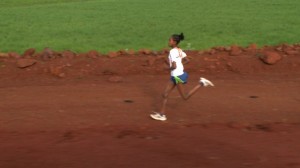In “Arirang,” controversial Korean filmmaker Kim Ki-duk re-enacts his spiritual, mental and professional breakdown after an accident nearly killed his lead actress on the set of his 2008 film, “Dream.” Up until this point Kim had been prolific, making 15 films in 12 years and deeply dividing critics and audiences with his raw cinematic style, disturbingly violent scenes and animal cruelty. However, the accident stopped him dead in his tracks and Kim locked himself away in a remote cabin in self-imposed exile to overthrow his wracking guilt and examine his priorities as a film director and as a human being.
What is striking from the wordless opening 10 minutes is not the grinding monotony of Kim’s ramshackle existence–we see him eat by gaslight, make coffee, brush his hair, chop firewood and scan the countryside with a lens–but the fact he has a Mac sitting in his tent. This begs the question: are we ever truly exiled in this age of unlimited communication? Is this strange documentary really just an elaborate piece of performance art, a calculated Oprah moment so that we welcome him back with open arms or an honest attempt to come to terms with the monster he had become?
Over the course of the film Kim is then berated and lambasted through interviews with himself and his shadow. Kim shouts, screams and cries becoming a gibbering wreck only to laugh at himself as he watches his rants back on his Mac. Between the drunken madness Kim dissects his unhappy childhood, the mundane factory jobs, and betrayal by his assistant directors with a certain degree of humanity and humility. Then Kim’s emotions are stripped back again, relentlessly spilling his guts over the screen in an effort to brow beat us into sympathy. Can we ever believe a director who tells us, “my life right now is a documentary and a drama”?
As fascinating, boring and compelling as Kim-Ki Duk’s introspective odyssey might be, one can only imagine what the main subjects of the documentary “Town of Runners” would make of such self-indulgence. Teenage girls Hawii and Alemi live in the small town of Bekoji, famed for producing a who’s who of Ethiopian long distance runners. Both dream of striding in their famous footsteps. The irrepressible Sentayehu Eshetu coaches Hawii and Alemi and all the other young prospects with a sunny determination- his main task to pass them on to athletic clubs in the larger towns.
Director Jerry Rothwell frames his film through the seasons over 3 years. Throughout this time, the friendly rivalry of the girls gradually takes them into a government run scheme to train the best runners along the same lines as the successful Kenyan programme. The experiences of both Hawii and Alemi couldn’t be more different in their respective clubs: Hawii, the more gifted runner, relapses as she is kept in a rundown shack with the other young athletes and has to buy her own food. Alemi flourishes as her club is relatively well funded, her dreams of success kept alive whist Hawii’s nightmare deepens when she falls ill.
Through the trials and tribulations of the young friends, Rothwell shows how Ethiopia is gradually emerging from the 1980s image of famine and desperation. Its success on the running track is clearly a national obsession but this sense of pride is sadly undermined at times by the government’s inability to follow through on its well meaning schemes to breed more athletes. Bureaucracy, lack of funds and corruption all conspire to rob Hawii of her passion to better herself and her family. Constantly in the background is the spectre of Chinese industrialisation as a road is gradually bringing change to Bekoji – if this is for better or worse is never made entirely clear.
How refreshing it is to see that Hawii and Alemi measure fame with talent and hard work rather than through a reality show or marriage. Alongside all the athletes in this Olympic games they can truly, “Inspire a Generation.”

